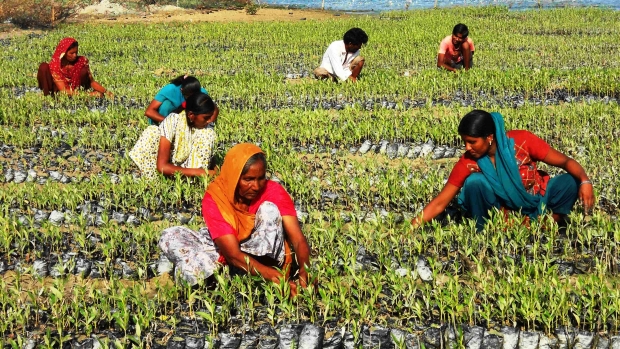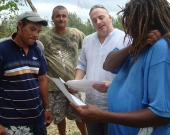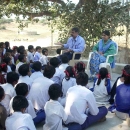Grants :: Small Grant Facilities :: Conserving and regenerating mangroves at Mithapur
Conserving and regenerating mangroves at Mithapur

Women and Youth working at Arambda nursery, Gujarat, India © TCSRD, 2007
Objectives
This Tata Chemicals Society for Rural Development (TCSRD) project aimed to convert just over 12 hectares of barren mudflats to mangrove forest, thus increasing awareness and knowledge of community-based mangrove management, and developing a model for larger mangrove planting programmes in the same area. The project’s goals were also to provide alternative livelihood opportunities for local people, in particular disadvantaged women and youth (for example working in tree nurseries), and to set up ECO clubs in village schools.
Background
The Indian chemicals company, Tata Chemicals Limited, through its social arm, TCSRD, is involved in resource management, environmental conservation, and income generation and health programmes to improve the quality of life at Mithapur, near the Arabian Sea coast where it operates. Tata asked MFF India to help build its capacity in mangrove restoration, with a view to rehabilitating a former mangrove habitat devastated by prolonged drought and overgrazing in the 1980s. The project was designed to embrace all of TCSRD’s objectives, including conservation, empowering women, income generation, community involvement and education.
Target beneficiaries
Local communities, especially women and young people.
Outputs
- A mangrove nursery established, planting sites identified, and 52,400 mangrove trees planted.
- The creation of ECO clubs in village schools to encourage young people to become conservation champions and contribute to the project’s long-term sustainability.
- The ECO clubs constructively engaged 2,500 young people in 25 rural schools, familiarizing them with the issues and opportunities of mangrove conservation through awareness and exposure visits.
- The establishment of self-help groups in local villages to empower women and generate income.
Accomplishments and challenges
Besides meeting every project goal, MFF India successfully engaged the support of a large corporate partner by building its capacity for conservation and by developing an integrated management approach to coastal conservation. This achievement has kindled interest in cooperating with MFF and IUCN among other companies (for example Hazira port in Gujarat).
The ECO club awareness campaign reached 2,500 students in 25 rural schools. Management of mangrove nurseries created 466 days of employment for disadvantaged women in the project’s self-help groups. TCSRD plans to scale up project activities by planting a further 162 hectares of mangroves, thus creating extra income for local communities, and is exploring the potential for mangrove ecotourism businesses.
Challenges
The project was delayed by setbacks in acquiring land rights. A study conducted by the National Institute of Oceanography (NIO) found that mangrove planting and establishment of a 50-m buffer zone at the original target site, Charakla salt works, would negatively impact ongoing salt work operations. As a result a new site had to be found and the mangrove restoration site moved there.
At the mangrove nursery site, extra effort had to be devoted to minimize the impacts of algae and seaweed growth, which suffocated mangrove seedlings. Some herders also used the mangroves at the new site for grazing camels, which damaged seedlings at the Arambda nursery. These issues were addressed before the planting began.
Contributions to cross-cutting themes
Communications
The project produced several leaflets and posters to explain and promote its activities, and presented a report on its findings to the State-Level Steering Committee for the Conservation of Mangroves and Coral in May 2009.
Gender equality
Through the project, TCSRD became aware of the problems facing local women and responded by proactively establishing self-help groups to empower women and generate income. Training and the mangrove nursery and planting activities generated 466 days of employment for 25 women and disadvantaged young people.
Lessons Learned
The project showed that the corporate sector can play a leading role in demonstrating how development and conservation needs can be balanced.
Another lesson learned was about the need, especially in land restoration work, to ensure that land ownership rights are secured before releasing any funding.
Related News
MFF projects encourage public participation in coastal management
Bangkok, Thailand 25 Jul 2012
Country: Asia Region
Topic: Capacity development, Civil Society Engagement, Capacity Building ...
MFF aims to achieve long term solutions that contribute to regional and national efforts that ensure environment issues are mainstreamed in development planning and activities. Hence, bringing together governments, non-government entities and the pr...
Project Facts
Country
Location
Mithapur, Gujarat, India
Topic
- Knowledge for Management
- Civil Society Engagement
- Coastal Governance
- Gender equality
- Knowledge management and communications
Duration
12th Dec 2008 to 31st Oct 2009
MFF Grant Amount
US$8,000 (MFF), US$17,500 (Tata Chemicals Limited)
Co-financing Partner
The community work component was implemented by TCSRD.
Implementing Partner
Ms Alka Talwar
Tata Chemicals Society for Rural
Development (TCSRD), Ground floor,
Leela Business Park, Andheri East,
Mumbai, India
Email: alkatalwar@tatachemicals.com
Related Events
Sharing Lessons on Mangrove Restoration - MFF Regional Colloquium
Mamallapuram, near Chennai (Tamil Nadu), India 30 Aug - 31 Aug 2012
A regional colloquium on sharing lessons in mangrove restoration on August 30-31, 2012 in Chennai, India examines the various experiences from MFF countries where mangrove projects have been carried out. The colloquium ...



